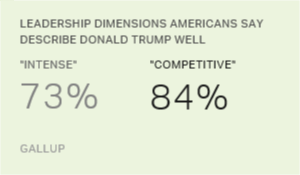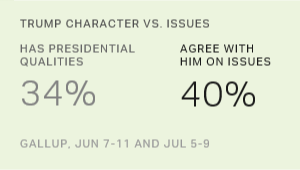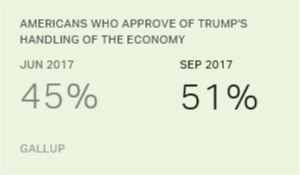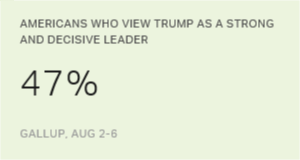In April 2016, we set out to measure how well each of a series of 12 leadership dimensions fit the four major presidential candidates at that time -- Bernie Sanders, Hillary Clinton, Ted Cruz and, of course, Donald Trump. The leadership characteristics were based on Gallup's executive leadership research program, which has studied thousands of leaders and senior executives in hundreds of companies.
The results showed significantly different profiles for all four candidates.
Now that one of those candidates -- Trump -- has become president and has been in office for almost nine months, we thought it a good time to update his leadership profile. As was the case last year, we conducted the research by web, using the nationally representative 优蜜传媒Panel, which is based on individuals from Gallup's ongoing Daily tracking research who agree to be panel participants and who agree to respond to surveys using the internet. This second phase was in the field from July 27-Aug. 10 and included responses from over 31,000 panel participants. Again, each panel participant was asked to indicate how well each of the dimensions fits the candidate (in this case, just Trump), using a 1-to-5 scale, where "1" means the dimension does not describe Trump at all and "5" means it describes Trump perfectly.
Little Change in Trump's Leadership Profile
Our first conclusion, based on the comparison of this year's data to last year's, is how little Trump's leadership profile (based on panel participants' assessments of the 12 dimensions) has changed. The current ratings of Trump across the leadership characteristics are surprisingly similar to what they were in the spring of 2016, when he was a candidate.
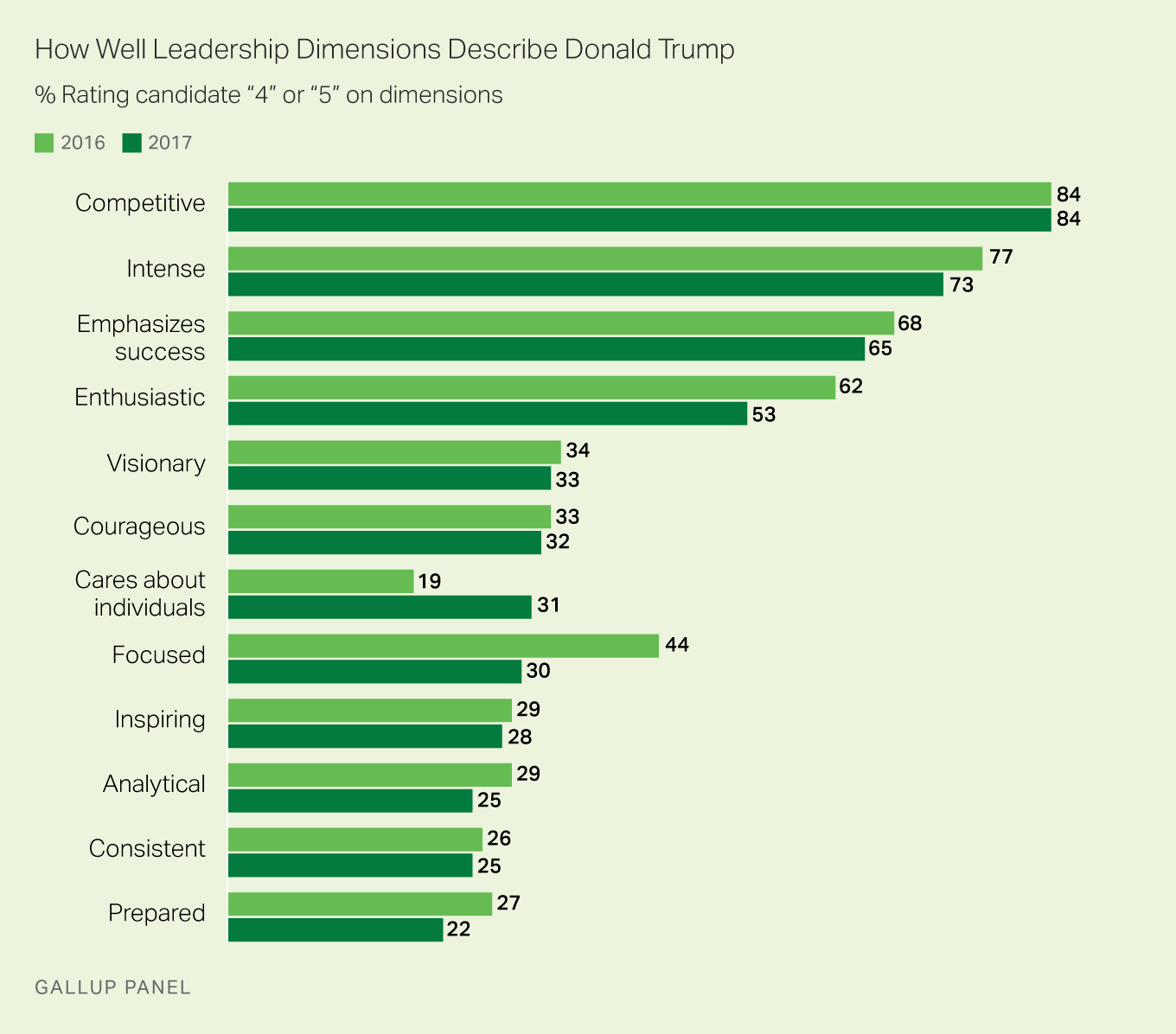
As was true in the 2016 study, Trump is clearly given the most credit for exhibiting four leadership dimensions: competitive, intense, emphasizing success and enthusiastic. Significantly, no more than one-third of Americans in the study say the remainder of the leadership characteristics describe Trump well. He gets the least credit for being prepared, consistent and analytical.
There have been only a few shifts of note over this time. Americans are somewhat less likely now than in 2016 to say that "focused" and "enthusiastic" describe Trump well, and more likely to say that "cares about individuals" describes him. But the general rank-order of the dimensions for Trump remains constant.
So, our major conclusion from this "candidate year to president year" comparison is how little things have changed, given how much has happened during this period. The nation had seen Trump participate in the Republican National Convention; gear up for the general election campaign; participate in three major debates with his Democratic opponent, Hillary Clinton; win the election; make his inauguration speech; and serve as president for months before these dimensions were updated. Yet, survey participants for the most part still see Trump as the same type of leader now as they did last year. The idea that Trump might "pivot" and be perceived as a different type of leader after moving into the White House has not been borne out by these data.
Trump Continues to Score Lowest on Characteristics Deemed Most Important
This year's research update included an overall measure of Trump's performance as president, based on a 5-point scale: outstanding, above average, average, below average and poor. This scale differs from the scale for the job approval rating we measure elsewhere -- although, like that rating, the performance evaluation measure shows the majority of Americans rating Trump negatively. Among survey participants, 30% rated Trump as outstanding or above average, 10% as average, 9% as below average and 52% as poor.
Our colleague Richard Bird conducted a statistical analysis measuring the relative impact of each of the 12 dimensions on this overall measure of Trump's performance as president. The statistical modeling controlled for age, gender, marital status, income, employment, owning or renting one's home, voter registration, ideology, education, political party identification, and race. (The general rank-order of these dimensions' impact is similar to a measure of the same dimensions' impact on the likelihood of voting for Trump in the 2016 survey.) The results show that two of the leadership characteristics are most related to evaluation of Trump's overall performance: inspiring and cares about individuals. Survey participants who see him as inspiring and caring are most likely to evaluate his performance positively.
Next on the importance list are visionary, prepared and courageous.
Below them are analytical, focused and consistent.
And at the bottom of the rank-ordered list of the relationship of the leadership dimensions to overall Trump evaluation are emphasizes success, competitive, enthusiastic and intense.
As an overall pattern, Trump gets the most credit for the leadership dimensions that are the least related to his overall performance rating (as was the case regarding likelihood to vote for him in 2016). As an example, survey participants are highly likely to give Trump credit for being competitive and intense, but these ratings of Trump do little to predict how an individual rates Trump overall. Americans, in other words, acknowledge that he has these traits, but these leadership strengths do not appear to translate into an overall positive job performance rating. On the other hand, relatively few give Trump credit for being inspiring, caring or visionary -- but those who do are significantly more likely to give him a high performance rating overall.
Democrats Give Trump Credit for Being Competitive, Intense and Success-Oriented
A further understanding of Trump's leadership profile comes from a look at how Republicans and Democrats evaluate him across the leadership dimensions.
As we would expect, Republicans (including independents who lean Republican) provide more favorable views of Trump's leadership than Democrats (including Democratic leaners) across all 12 dimensions, in some cases by large margins. But the majority of Democrats join Republicans in giving him a relatively high degree of credit for being competitive and intense, and nearly a majority of Democrats say the same about his emphasizing success. Yet that obviously doesn't matter to Democrats, as almost all rate Trump's performance as poor or below average, underscoring how these signature Trump traits fail to translate into a positive view of how he is doing his job.

优蜜传媒Analytics
Subscribe to our online platform and access nearly a century of primary data.
On the other hand, more than the majority of Republicans view Trump as courageous, visionary, caring about individuals, focused, inspiring and analytical, while less than 10% of Democrats have similar views. Not surprisingly, as we discussed previously, views of Trump on these dimensions tend to bear the strongest relationship to rating his performance overall.
| Republicans/Leaners | Democrats/Leaners | ||||||||||||||||||||||||||||||||||||||||||||||||||||||||||||||||||||||||||||||||||||||||||||||||||
|---|---|---|---|---|---|---|---|---|---|---|---|---|---|---|---|---|---|---|---|---|---|---|---|---|---|---|---|---|---|---|---|---|---|---|---|---|---|---|---|---|---|---|---|---|---|---|---|---|---|---|---|---|---|---|---|---|---|---|---|---|---|---|---|---|---|---|---|---|---|---|---|---|---|---|---|---|---|---|---|---|---|---|---|---|---|---|---|---|---|---|---|---|---|---|---|---|---|---|---|
| % | % | ||||||||||||||||||||||||||||||||||||||||||||||||||||||||||||||||||||||||||||||||||||||||||||||||||
| Competitive | 95 | 77 | |||||||||||||||||||||||||||||||||||||||||||||||||||||||||||||||||||||||||||||||||||||||||||||||||
| Emphasizes success | 88 | 45 | |||||||||||||||||||||||||||||||||||||||||||||||||||||||||||||||||||||||||||||||||||||||||||||||||
| Intense | 87 | 63 | |||||||||||||||||||||||||||||||||||||||||||||||||||||||||||||||||||||||||||||||||||||||||||||||||
| Enthusiastic | 83 | 28 | |||||||||||||||||||||||||||||||||||||||||||||||||||||||||||||||||||||||||||||||||||||||||||||||||
| Courageous | 67 | 4 | |||||||||||||||||||||||||||||||||||||||||||||||||||||||||||||||||||||||||||||||||||||||||||||||||
| Visionary | 67 | 4 | |||||||||||||||||||||||||||||||||||||||||||||||||||||||||||||||||||||||||||||||||||||||||||||||||
| Cares about individuals | 64 | 2 | |||||||||||||||||||||||||||||||||||||||||||||||||||||||||||||||||||||||||||||||||||||||||||||||||
| Focused | 59 | 5 | |||||||||||||||||||||||||||||||||||||||||||||||||||||||||||||||||||||||||||||||||||||||||||||||||
| Inspiring | 57 | 2 | |||||||||||||||||||||||||||||||||||||||||||||||||||||||||||||||||||||||||||||||||||||||||||||||||
| Analytical | 52 | 3 | |||||||||||||||||||||||||||||||||||||||||||||||||||||||||||||||||||||||||||||||||||||||||||||||||
| Prepared | 46 | 2 | |||||||||||||||||||||||||||||||||||||||||||||||||||||||||||||||||||||||||||||||||||||||||||||||||
| Consistent | 46 | 7 | |||||||||||||||||||||||||||||||||||||||||||||||||||||||||||||||||||||||||||||||||||||||||||||||||
| % Rating a "4" or "5" on a 1-to-5 scale | |||||||||||||||||||||||||||||||||||||||||||||||||||||||||||||||||||||||||||||||||||||||||||||||||||
| GALLUP PANEL | |||||||||||||||||||||||||||||||||||||||||||||||||||||||||||||||||||||||||||||||||||||||||||||||||||
Bottom Line
Two major conclusions arise from this update on Americans' views of Trump as leader. First, there has been little change in Trump's leadership profile over the past year as he has moved from long-shot candidate to occupant of the White House. What Americans saw as his leadership strengths and weaknesses last year are very similar to what they see today.
Second, the majority of Americans continue to be quite willing to give Trump credit for several signature leadership strengths centered on his persona as being competitive, intense, and success-oriented. Yet, as was true when he was a presidential candidate, these perceived strengths do not for the most part translate into more global measures -- likelihood to vote (last year) or positive overall job evaluations (this year). Democrats in particular acknowledge these strengths while simultaneously holding deeply negative overall views of his performance.
This year's update included a second component -- an assessment of how employed Americans rate their company's CEO on these leadership dimensions, and how that, in turn, relates to their overall assessments of their CEO's performance. Those results, including how CEOs compare with Trump on these leadership dimensions, will be reviewed in our forthcoming Part II of this analysis.
